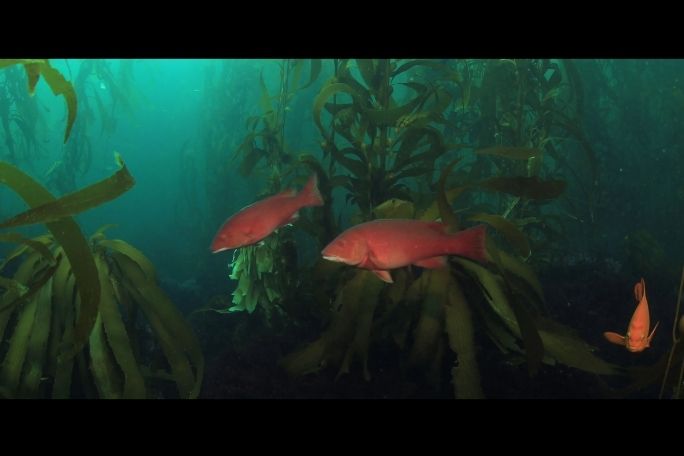Lesson summary
In this lesson, students will be immersed in, and connect with, the documentary film 2040, focusing on the topic of food chains and food webs. Students begin by completing a Flipped Classroom preparation activity to introduce the topics of food chains and food webs. Back in the classroom, students are asked to share what they learnt about food chains and webs before exploring energy flow and trophic levels in a marine food web. They then participate in an activity to demonstrate how food webs can collapse when organisms within the food web experience a decline in numbers.
Students then explore how seaweed farming could improve marine food webs as well as benefit human populations. Finally, students are asked to think about what other actions humans can take to improve marine food webs and to communicate their ideas through a poster or infographic.
Learning intentions:
Students will...
- understand what a food chain is and what a food web is
- understand how marine food webs are vulnerable to human activities
- understand actions that humans can take to improve marine food webs and habitats
Success criteria:
Students can...
- complete a flipped classroom activity in their own time
- participate in class and group discussions
- work independently and collaboratively
- undertake research
- create an infographic or poster
Lesson guides and printables
Lesson details
Curriculum mapping
- Unit of work: 2040 – Science – Years 7 to 10
- Time required: 90 mins
- Level of teacher scaffolding: Medium – oversee activities and facilitate class discussions
To view our Australian Curriculum alignment, click here.
To view our NZ Curriculum alignment, click here.
Resources required
- Student Worksheets – one copy per student
- Device capable of presenting a video to the class
- Food chains and food webs factsheet
- Trophic levels factsheet
- Marine food webs activity
- Marine food webs activity – answers
- Ocean Acidification Factsheet
Additional info
2040 is an innovative feature documentary that looks to the future, but is vitally important NOW! Director Damon Gameau embarks on a journey to explore what the future could look like by the year 2040 if we simply embraced the best solutions already available to us to improve our planet and shifted them rapidly into the mainstream.
In Australia: Order the Schools Version of the 2040 DVD. The Schools Version includes an educational license and is for Australian primary and secondary schools that wish to utilise the film as a learning tool or host free on-site screenings for the school community.
In New Zealand: Order the Schools Version of the 2040 DVD. The Schools Version includes an educational license and is for New Zealand primary and secondary schools that wish to utilise the film as a learning tool or host free on-site screenings for the school community.
If you are teaching in either New Zealand or Australia, you can now organise a virtual screening of the film for your class. To enquire about this option, simply email schools@whatsyour2040.com and the 2040 team will help you set this up! If you have already bought a DVD of the film and you have a ClickView account, you can email the team for permission to upload the film to your account to make it more easily accessible for your teachers and students.
Cool.org, GoodThing Productions and Regen Pictures would like to acknowledge the generous contributions of Good Pitch Australia, Shark Island Institute, Documentary Australia Foundation, The Caledonia Foundation and our philanthropic partners in the development of these teaching resources.


Welcome back!
Don't have an account yet?
Log in with:
By signing up to Cool.org you consent and agree to Cool's privacy policy to
store, manage and process your personal information. To read more, please see
our privacy policy here(Opens in new tab).
Create your free Cool.org account.
Many of our resources are free, with an option to upgrade to Cool+ for premium content.
Already have an account?
Sign up with:
By signing up to Cool.org you consent and agree to Cool's privacy policy to
store, manage and process your personal information. To read more, please see
our privacy policy here(Opens in new tab).